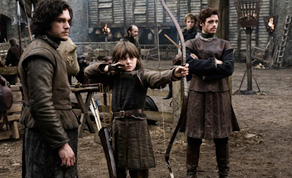 | | Game of Thrones filmed in Northern Ireland |
Existing WorksIf a feature film or television project is to be based on an existing work in copyright, the producer normally negotiates an option to purchase the film and allied rights in the work from the copyright owner. Usually the producer contacts the author of the work through his publisher or literary agent.
Copyright The period of copyright is now 70 years from the end of the year in which the author of the work died with the result that for example the works of WB Yeats who died in 1939 and James Joyce who died in 1941 are still in copyright. The 70 year rule applies to authors in the European Union and was introduced on the 1st July 1995. The position in the United States is still governed by the old 50 year rule but the transitional provisions in the Copyright Act 1976 of the United States when they introduced the 50 year rule have meant that many works have stayed in copyright longer than 50 years after the death of the author. Option Fee and Option Period An option agreement provides that the owner of the copyright grants to the producer an option to purchase the film and allied rights in the work for an option fee. An option fee can be anything from ,500 to ,50,000 but is normally at the lower end of the scale and the option period is normally one year, renewable for a further year (and possibly another year after that) on payment of an additional small sum. Purchase Price The purchase price which has to be agreed at the time the option is negotiated (otherwise the Option Agreement is useless) in relation to feature films is commonly expressed as a percentage of the budget. London agents who commonly represent Irish as well as international authors and authors' estates, usually ask for 2.5% of the full budget but producers can negotiate this downwards, particularly for works which have been around for a considerable period without having either been optioned or produced. Also, agents like to have minima and producers maxima in relation to the purchase price (usually referred to as 'ceilings'and 'floors'). Agents will also want their authors to be paid for sequels and remakes (66.2/3rd% and 33.1/3rd% of the original purchase price respectively) as well as an amount per hour for any television series arising from the film. They will also want a share in profits (2.5% of producer's share of net profits is common).
Why an Option? The main value from a producers point of view to an Option Agreement is that he does not have to pay the full purchase price of the film rights as part of the development process while, at the same time, being able to make sure that nobody else can buy the rights. The Option Agreement route suits copyright owners because, if the producer fails to get the project off the ground, the rights revert when the option period expires and the copyright owner can go elsewhere.
Unpublished Screenplays Option arrangements are sometimes used where what is being developed is an unpublished screenplay which was written by the screenplay writer off his own bat. This is particularly so because normally screenplay agreements provide that the copyright belongs to the producer and any screenplay writer who has written a screenplay himself will want the screenplay back if the producer does not succeed in advancing the project to production within a specified period. | 
